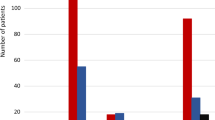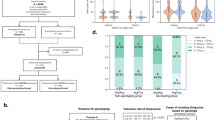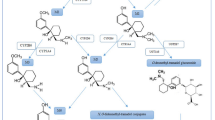Abstract
Purpose
To investigate the effects of genetic polymorphisms on morphine-induced adverse events in cancer patients.
Methods
We examined the relation of morphine-related adverse events to polymorphisms in UDP-glucuronosyltransferase (UGT) 2B7, ATP-binding cassette, sub-family B, number 1 (ABCB1), and μ-opioid receptor 1 genes in 32 Japanese cancer patients receiving oral controlled-release morphine sulfate tablets.
Results
The T/T genotype at 1236 or TT/TT diplotype at 2677 and 3435 in ABCB1 was associated with significantly lower frequency of fatigue (grades 1–3) (P = 0.012 or 0.011, Fisher’s exact test). The UGT2B7*2 genotype was associated with the frequency of nausea (grades 1–3) (P = 0.023). The frequency of nausea was higher in patients without UGT2B7*2 allele than others. The diplotype at 2677 and 3435 in ABCB1 was associated with the frequency of vomiting (grades 1–3) (P = 0.011). No patient whose diplotype was consisted of no GC allele at 2677 and 3435 suffered from vomiting.
Conclusion
Our findings suggest that pharmacogenetics can be used to predict the risk of morphine-induced adverse events.



Similar content being viewed by others
References
Evans WE, Relling MV (1999) Pharmacogenomics: translating functional genomics into rational therapeutics. Science 286:487–491
Evans WE, McLeod HL (2003) Pharmacogenomics—drug disposition, drug targets, and side effects. N Engl J Med 348:538–549
Evans WE, Relling MV (2004) Moving towards individualized medicine with pharmacogenomics. Nature 429:464–468
Huang RS, Ratain MJ (2009) Pharmacogenetics and pharmacogenomics of anticancer agents. CA Cancer J Clin 59:42–55
Coffman BL, Rios GR, King CD et al (1997) Human UGT2B7 catalyzes morphine glucuronidation. Drug Metab Dispos 25:1–4
Christrup LL (1997) Morphine metabolites. Acta Anaesthesiol Scand 41:116–122
Hirota T, Ieiri I, Takane H et al (2003) Sequence variability and candidate gene analysis in two cancer patients with complex clinical outcomes during morphine therapy. Drug Metab Dispos 31:677–680
Duguay Y, Báár C, Skorpen F et al (2004) A novel functional polymorphism in the uridine diphosphate-glucuronosyltransferase 2B7 promoter with significant impact on promoter activity. Clin Pharmacol Ther 75:223–233
Somogyi AA, Barratt DT, Coller JK (2007) Pharmacogenetics of opioids. Clin Pharmacol Ther 81:429–444
Wandel C, Kim R, Wood M et al (2002) Interaction of morphine, fentanyl, sufentanil, alfentanil, and loperamide with the efflux drug transporter P-glycoprotein. Anesthesiology 96:913–920
Sai K, Itoda M, Saito Y et al (2006) Genetic variations and haplotype structures of the ABCB1 gene in a Japanese population: an expanded haplotype block covering the distal promoter region, and associated ethnic differences. Ann Hum Genet 70:605–622
Campa D, Gioia A, Tomei A et al (2008) Association of ABCB1/MDR1 and OPRM1 gene polymorphisms with morphine pain relief. Clin Pharmacol Ther 83:559–566
LaForge KS, Yuferov V, Kreek MJ (2000) Opioid receptor and peptide gene polymorphisms: potential implications for addictions. Eur J Pharmacol 410:249–268
Hoehe MR, Köpke K, Wendel B (2000) Sequence variability and candidate gene analysis in complex disease: association of mu opioid receptor gene variation with substance dependence. Hum Mol Genet 9:2895–2908
Zhang Y, Wang D, Johnson AD et al (2005) Allelic expression imbalance of human mu opioid receptor (OPRM1) caused by variant A118G. J Biol Chem 280:32618–32624
Klepstad P, Rakvåg TT, Kaasa S et al (2004) The 118A > G polymorphism in the human mu-opioid receptor gene may increase morphine requirements in patients with pain caused by malignant disease. Acta Anaesthesiol Scand 48:1232–1239
Sai K, Kaniwa N, Itoda M et al (2003) Haplotype analysis of ABCB1/MDR1 blocks in a Japanese population reveals genotype-dependent renal clearance of irinotecan. Pharmacogenetics 13:741–757
Coffman BL, King CD, Rios GR et al (1998) The glucuronidation of opioids, other xenobiotics, and androgens by human UGT2B7Y(268) and UGT2B7H(268). Drug Metab Dispos 26:73–77
Meineke I, Freudenthaler S, Hofmann U et al (2002) Pharmacokinetic modelling of morphine, morphine-3-glucuronide and morphine-6-glucuronide in plasma and cerebrospinal fluid of neurosurgical patients after short-term infusion of morphine. Br J Clin Pharmacol 54:592–603
Kim RB, Leake BF, Choo EF et al (2001) Identification of functionally variant MDR1 alleles among European Americans and African Americans. Clin Pharmacol Ther 70:189–199
Hoffmeyer S, Burk O, von Richter O et al (2000) Functional polymorphisms of the human multidrug-resistance gene: multiple sequence variations and correlation of one allele with P-glycoprotein expression and activity in vivo. Proc Natl Acad Sci USA 97:3473–3478
Fellay J, Marzolini C, Meaden ER et al (2002) Response to antiretroviral treatment in HIV-1-infected individuals with allelic variants of the multidrug resistance transporter 1: a pharmacogenetics study. Lancet 359:30–36
Nasi M, Borghi V, Pinti M et al (2003) MDR1 C3435T genetic polymorphism does not influence the response to antiretroviral therapy in drug-naive HIV-positive patients. AIDS 17:1696–1698
Saitoh A, Singh KK, Powell CA et al (2005) An MDR1-3435 variant is associated with higher plasma nelfinavir levels and more rapid virologic response in HIV-1 infected children. AIDS 19:371–380
Verstuyft C, Marcellin F, Morand-Joubert L et al (2005) Absence of association between MDR1 genetic polymorphisms, indinavir pharmacokinetics and response to highly active antiretroviral therapy. AIDS 19:2127–2131
Haas DW, Smeaton LM, Shafer RW et al (2005) Pharmacogenetics of long-term responses to antiretroviral regimens containing Efavirenz and/or Nelfinavir: an Adult Aids Clinical Trials Group Study. J Infect Dis 192:1931–1942
Kajinami K, Brousseau ME, Ordovas JM et al (2004) Polymorphisms in the multidrug resistance-1 (MDR1) gene influence the response to atorvastatin treatment in a gender-specific manner. Am J Cardiol 93:1046–1050
Siddiqui A, Kerb R, Weale ME et al (2003) Association of multidrug resistance in epilepsy with a polymorphism in the drug-transporter gene ABCB1. N Engl J Med 348:1442–1448
Zheng HX, Webber SA, Zeevi A et al (2004) The impact of pharmacogenomic factors on steroid dependency in pediatric heart transplant patients using logistic regression analysis. Pediatr Transplant 8:551–557
Yi SY, Hong KS, Lim HS et al (2004) A variant 2677A allele of the MDR1 gene affects fexofenadine disposition. Clin Pharmacol Ther 76:418–427
Morita N, Yasumori T, Nakayama K (2003) Human MDR1 polymorphism: G2677T/A and C3435T have no effect on MDR1 transport activities. Biochem Pharmacol 65:1843–1852
Kimchi-Sarfaty C, Gribar JJ, Gottesman MM (2002) Functional characterization of coding polymorphisms in the human MDR1 gene using a vaccinia virus expression system. Mol Pharmacol 62:1–6
Coulbault L, Beaussier M, Verstuyft C et al (2006) Environmental and genetic factors associated with morphine response in the postoperative period. Clin Pharmacol Ther 79:316–324
Reyes-Gibby CC, Shete S, Rakvåg T et al (2007) Exploring joint effects of genes and the clinical efficacy of morphine for cancer pain: OPRM1 and COMT gene. Pain 130:25–30
Acknowledgments
This study was supported in part by a Grant-in-Aid for Scientific Research (C) (19590542) from the Japan Society for the Promotion of Science to K.F., a grant from the Japan Research Foundation for Clinical Pharmacology to K.F., Grant-in-Aid for Development of New Technology from The Promotion to Y.O. and Mutual Aid Corporation for Private Schools of Japan to Y.O. We thank A. Sparreboom (St. Jude Children’s Research Hospital) for kind review of our manuscript, Y. Yatsuka and T. Hirata for their technical assistance.
Conflict of interest statement
None.
Author information
Authors and Affiliations
Corresponding author
Rights and permissions
About this article
Cite this article
Fujita, Ki., Ando, Y., Yamamoto, W. et al. Association of UGT2B7 and ABCB1 genotypes with morphine-induced adverse drug reactions in Japanese patients with cancer. Cancer Chemother Pharmacol 65, 251–258 (2010). https://doi.org/10.1007/s00280-009-1029-2
Received:
Accepted:
Published:
Issue Date:
DOI: https://doi.org/10.1007/s00280-009-1029-2




